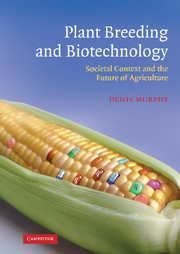Book contents
- Frontmatter
- Contents
- Preface
- Acknowledgements
- Using this book
- Nomenclature and terminology
- Abbreviations and glossary
- Introduction
- Part I The science of plant breeding
- Part II The societal context of plant breeding
- Part III Turmoil and transition: the legacy of the 1980s
- Part IV The agbiotech paradigm
- Part V Increasing global crop production: the new challenges
- 14 Feeding the world – fallacies and realities
- 15 The roles of management, subsidies and breeding in crop improvement
- Part VI Plant breeding in the twenty-first century
- Notes
- References
- Index
15 - The roles of management, subsidies and breeding in crop improvement
Published online by Cambridge University Press: 07 May 2010
- Frontmatter
- Contents
- Preface
- Acknowledgements
- Using this book
- Nomenclature and terminology
- Abbreviations and glossary
- Introduction
- Part I The science of plant breeding
- Part II The societal context of plant breeding
- Part III Turmoil and transition: the legacy of the 1980s
- Part IV The agbiotech paradigm
- Part V Increasing global crop production: the new challenges
- 14 Feeding the world – fallacies and realities
- 15 The roles of management, subsidies and breeding in crop improvement
- Part VI Plant breeding in the twenty-first century
- Notes
- References
- Index
Summary
Weak institutions and feeble contracts constitute the
most important challenge to the agricultural sector
Decio Zylbersztaijn (2005) EconomistIntroduction
In the previous chapter, we saw that there will be significant challenges to global food production over the next half century, but that a combination of enhanced economic development and improved land use can go a long way to meeting future food demands. In this chapter, we will survey some of the other important strategies that can be used to enhance food production. Such options include improved management at all levels, from on-farm organisation of crops, through the entire transport and processing chains, and including any related physical and fiscal/legal infrastructure. Another important factor stifling food production in many developing countries is the rampant subsidy/tariff-led overproduction of agricultural commodities in many richer countries. We will examine ways in which the reform of this iniquitous system could greatly stimulate global agriculture. Finally, we will look at the prospects for improving crop production via plant breeding, using all available strategies, including transgenesis. Here, we will see that the outlook for continued increases in crop yields is more promising than many scientists and other pundits believe. Finally, it will be concluded that, while transgenesis may give breeders a few additional options, it is no panacea for the many challenges that confront twenty-first century agriculture.
- Type
- Chapter
- Information
- Plant Breeding and BiotechnologySocietal Context and the Future of Agriculture, pp. 226 - 238Publisher: Cambridge University PressPrint publication year: 2007

